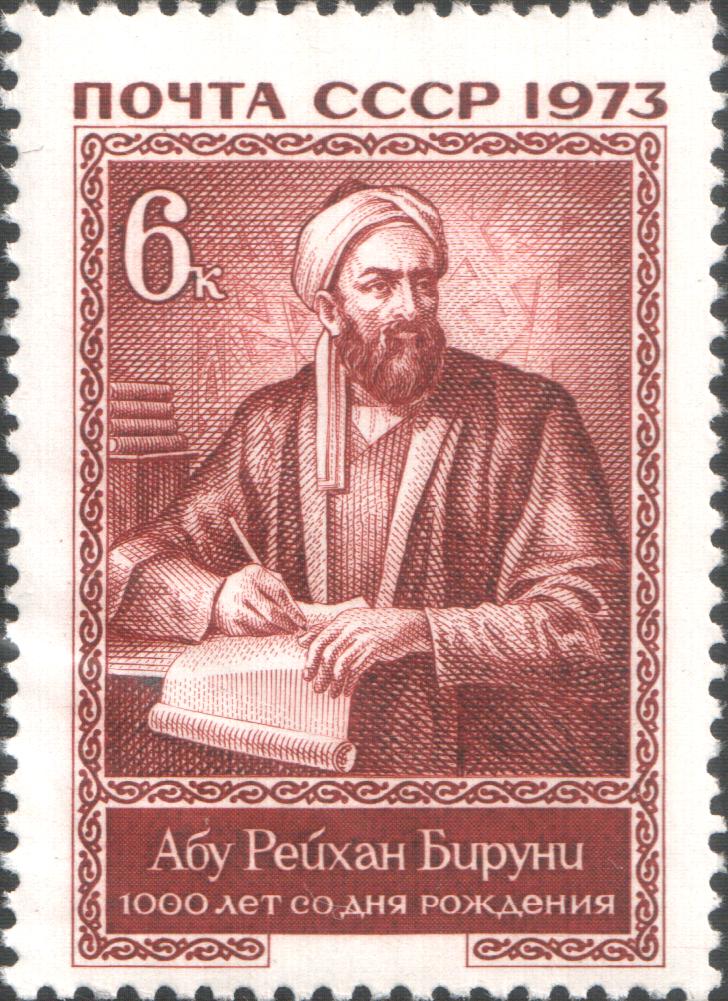Related Subjects
Al-Biruni
 Abu Rayhan Muhammad ibn Ahmad al-Biruni (; ) (973after 1050), known as al-Biruni, was a Khwarazmian Iranian scholar and polymath during the Islamic Golden Age. He has been called variously the "founder of Indology", "Father of Comparative Religion", "Father of modern geodesy", Founder of Indology and the first anthropologist.
Abu Rayhan Muhammad ibn Ahmad al-Biruni (; ) (973after 1050), known as al-Biruni, was a Khwarazmian Iranian scholar and polymath during the Islamic Golden Age. He has been called variously the "founder of Indology", "Father of Comparative Religion", "Father of modern geodesy", Founder of Indology and the first anthropologist.Al-Biruni was well versed in physics, mathematics, astronomy, and natural sciences, and also distinguished himself as a historian, chronologist, and linguist. He studied almost all the sciences of his day and was rewarded abundantly for his tireless research in many fields of knowledge. Royalty and other powerful elements in society funded al-Biruni's research and sought him out with specific projects in mind. Influential in his own right, Al-Biruni was himself influenced by the scholars of other nations, such as the Greeks, from whom he took inspiration when he turned to the study of philosophy. A gifted linguist, he was conversant in Khwarezmian, Persian, Arabic, Sanskrit, and also knew Greek, Hebrew, and Syriac. He spent much of his life in Ghazni, then capital of the Ghaznavids, in modern-day central-eastern Afghanistan. In 1017, he travelled to the Indian subcontinent and wrote a treatise on Indian culture entitled ("''The History of India''"), after exploring the Hindu faith practiced in India.}} He was, for his time, an admirably impartial writer on the customs and creeds of various nations, his scholarly objectivity earning him the title ("The Master") in recognition of his remarkable description of early 11th-century India. Provided by Wikipedia
Rāshīkāt al-Hind : Tanāsub nazd-i Hindiyān /
:
Abū Rayḥān al-Bīrūnī (d. after 442/1050) is one of the greatest scholars in the history of Islam. A native of Kāth, capital of Khwārazm, he wrote on subjects ranging from mathematics, geography, astronomy and natural science to history, linguistics and ethnography. He was a student of, among others, the astronomer-mathematicians Kushyār b. Labbān (fl. 390/1000) and Abū Maḥmūd al-Khujandī (d. 390/1000). He also met and corresponded with Avicenna (d. 428/1037). As was common for a scholar of his rank in those days, he spent his life in the entourage of powerful rulers, in Khwārazm, Khurāsān, and Sidjistān. It was at the court of Maḥmūd b. Sebüktigin (d. 421/1030) and his sucessors in Ghazna that he accompanied Maḥmūd on his campaigns to north-west India. It is there that he got acquainted with Indian methods in the arithmetic of proportions and ratios, the subject of this book. Arabic text with a Persian translation by the editor.
:
1 online resource. :
9789004405615
9789648700954
